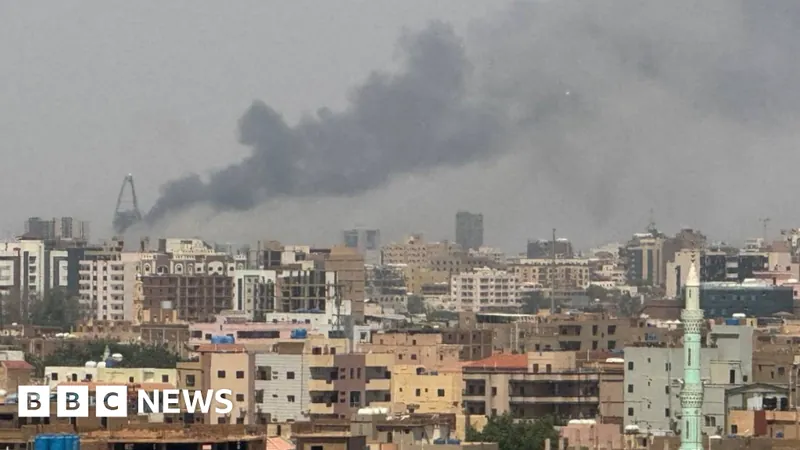
Explosive New Developments in Sudan's Civil War: Army Strikes Back in Khartoum
2024-09-26
Author: Ken Lee
Introduction
In a dramatic escalation of Sudan’s ongoing civil war, the national army has initiated a major offensive against the influential paramilitary group known as the Rapid Support Forces (RSF) in the capital city of Khartoum. This significant military action was launched early Thursday morning as government forces targeted RSF positions in both Khartoum and the neighboring Bahri region.
Humanitarian Crisis
Since the brutal conflict ignited in April 2023, the nation has been plunged into chaos, resulting in what the United Nations describes as one of the world's dire humanitarian crises. Disturbingly, estimates suggest that the death toll may have reached as high as 150,000, while upwards of 10 million people — constituting roughly one-fifth of Sudan's population — have been forcibly displaced from their homes due to the violence.
Military Escalation
Despite efforts led by the United States to negotiate a ceasefire during discussions at the UN General Assembly this week, military hostilities surged. Eyewitness accounts reported that the initial bombardments began in the night, intensifying as dawn broke. Reports indicate that the army has launched assaults across critical bridges spanning the River Nile, which serves as a natural divide between areas under government control and those dominated by RSF forces.
Clashes in Khartoum
While the RSF asserted that it successfully warded off the army’s advances, residents in central Khartoum reported hearing the sounds of gunfire and witnessing columns of smoke rising from various locations, signaling fierce clashes in the heart of the city. Historically, the RSF has maintained control over a significant portion of Khartoum since the onset of the conflict, making this recent offensive a pivotal move for the army as it attempts to regain lost territory.
Broader Humanitarian Situation
On a broader scale, the humanitarian situation in Sudan is deteriorating fast. The UN has urgently called for immediate measures to protect civilians and halt the ongoing violence. The fighting has predominantly occurred in densely populated areas, with both the army and RSF accused of indiscriminately bombing civilian locations. The UN warned that relentless hostilities have resulted in 'misery for millions,' triggering what is now recognized as the world's fastest-growing displacement crisis, with half of the displaced population consisting of children.
Consequences of the Conflict
The dire consequences of this conflict extend beyond immediate violence. The UN characterized the unfolding situation as 'the world's largest hunger crisis,' with widespread famine looming due to the inability to cultivate crops during the war. Furthermore, alarming reports have surfaced regarding potential genocide against non-Arabs in the war-torn region of Darfur, exacerbating fears among humanitarian organizations.
Health Crisis
Additionally, the country is grappling with a cholera outbreak, with the health ministry reporting over 430 deaths attributed to this preventable disease in just the past month. The ongoing conflict has severely hampered efforts to provide medical assistance to affected areas, compounding the tragedy faced by countless civilians in Sudan.
International Response
As the situation continues to develop, the international community watches closely, hoping for a resolution to a brutal conflict that has wrought havoc on the lives of millions. The world is left to ponder: how much longer can Sudan endure this relentless suffering, and what can be done to bring peace to a nation in turmoil?


 Brasil (PT)
Brasil (PT)
 Canada (EN)
Canada (EN)
 Chile (ES)
Chile (ES)
 España (ES)
España (ES)
 France (FR)
France (FR)
 Hong Kong (EN)
Hong Kong (EN)
 Italia (IT)
Italia (IT)
 日本 (JA)
日本 (JA)
 Magyarország (HU)
Magyarország (HU)
 Norge (NO)
Norge (NO)
 Polska (PL)
Polska (PL)
 Schweiz (DE)
Schweiz (DE)
 Singapore (EN)
Singapore (EN)
 Sverige (SV)
Sverige (SV)
 Suomi (FI)
Suomi (FI)
 Türkiye (TR)
Türkiye (TR)